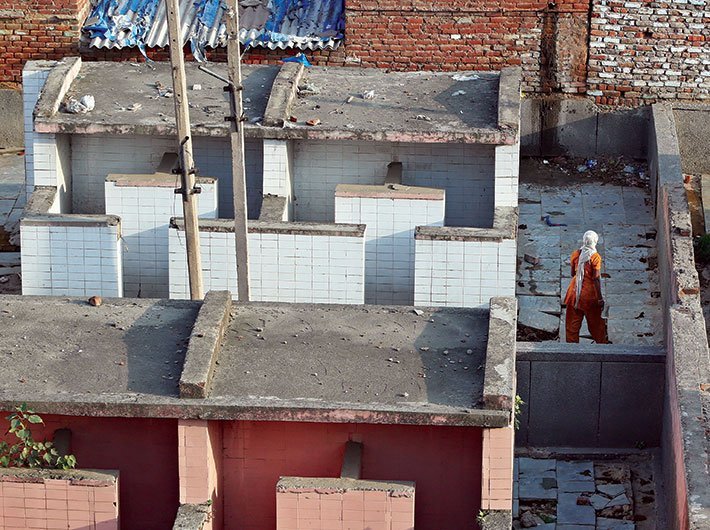There are significant differences in the number of manual scavengers identified by the states and those identified in the Social Economic Caste Census (SECC) 2011
There seems to be no end in sight for manual scavenging which still persists in some parts of the country.
In FY 2018-19, the union government allocated Rs 20 crore to Self- Employment Scheme for Rehabilitation of Manual Scavengers (SRMS), four times the Revised Estimates (RE) for the previous financial year, when Rs 5 crore had been allocated. No expenditure has been incurred by the union government under the scheme between FY 2014- 15 and FY 2016-17, said Accountability Initiative (AI) at the Centre for Policy Research HYPERLINK http://accountabilityindia.in/budget/briefs/download/1820
Read: “Swachh Bharat represents toilet users, not toilet cleaners”
There are significant differences in the number of manual scavengers identified by the states and those identified in the Social Economic Caste Census (SECC) 2011. States had identified only 8 percent (13,465) of the manual scavenger households listed in the SECC 2011 till December 2017. No manual scavengers were identified in 23 states and UTs.
The scheme provides a one-time cash assistance (OTCA) of Rs 40,000 to identified manual scavengers or their dependents. Till November 2017, OTCA had been given to 94 percent of identified beneficiaries, it said.
As of July 2017, 1,233 self-employment projects had been sanctioned across the country.
Read: Swachh Bharat: Why is manual scavenging still prevalent?
A compensation of Rs 10 lakh is to be provided to the manual scavenger's household in case of death related to sewer cleaning. As of December 2017, a total of 323 cases of such deaths had been reported. However, complete compensation was paid in only 63 percent or 251 cases.
SRMS was launched in 2007 to rehabilitate the identified manual scavengers and their dependents to alternate professions.
The revival followed the passing of the Prohibition of Employment as Manual Scavengers and their Rehabilitation Act, 2013. The scheme is run by the National Safai Karmacharis Finance and Development Corporation (NSKFDC).
Read: The graduates: breaking the curse of manual scavenging
The allocations for the scheme had been progressively declining till FY 2017-18. In FY 2013-14, the union government had allocated Rs 70 crore to the scheme. This decreased to Rs 47 crore in FY 2014-15 and further to only Rs 5 crore in FY 2015-16.
Allocations however increased significantly in FY 2018-19. Rs 20 crore has been allocated to the scheme, 4 times the allocations of the previous year.
In February 2016, union minister Vijay Sampla in a written reply to a question in Rajya Sabha said that SRMS has been revised in accordance with the provision of “Prohibition of Employment as Manual Scavengers and their Rehabilitation Act 2013” to provide the following benefits to the identified manual scavengers and their dependants.
(i) Onetime cash assistance of Rs.40,000/- to identified manual scavengers.
(ii) Loans for project cost upto Rs. 15.00 lacs on concessional rates of interest.
(iii) Credit linked back-end capital subsidy upto Rs. 3,25,000/-.
(iv) Skill Development Training upto two years with stipend of Rs.3000/- per month.
The major cause for manual scavenging is the existence of insanitary latrines. Section 5 of the MS Act, 2013 prohibits construction of insanitary latrines and engaging of manual scavengers from the date of commencement of the Act i.e. December 6, 2013. The Act provides for identification of insanitary latrines and their demolition/conversion into sanitary latrines on a time bound basis. The municipalities, Cantonment Boards and railway authorities have been mandated to construct adequate number of community sanitary latrines within a period of three years from the date of commencement of the Act to eliminate the practice of open defecation.
Read: Manhole of Indignity
Human Rights Watch in a report in 2015 “Cleaning Human Waste” said that India’s central government since independence in 1947 has adopted legislative and policy efforts to end manual scavenging. In recent years these include commitments to modernize sanitation so there is no further need for manual disposal of feces, and prohibitions on engaging anyone to do this work. However, because these policies are not properly implemented, people remain unaware of their right to refuse this role, and those who do refuse may face intense social pressure, including threats of violence and expulsion from their village, often with the complicity of local government officials.
Manual scavengers are usually from caste groups customarily relegated to the bottom of the caste hierarchy and confined to livelihood tasks viewed as deplorable or deemed too menial by higher caste groups. Their caste-designated occupation reinforces the social stigma that they are unclean or “untouchable” and perpetuates widespread discrimination. Women usually clean dry toilets, men and women clean excrement from open defecation sites, gutters, and drains, and men are called upon to do the more physically demanding work of cleaning sewers and septic tanks, the report said.
